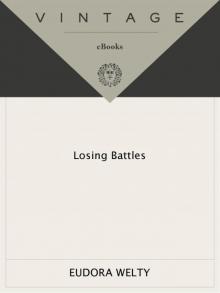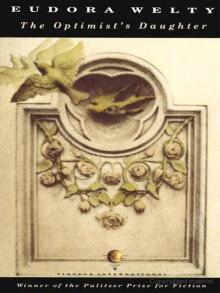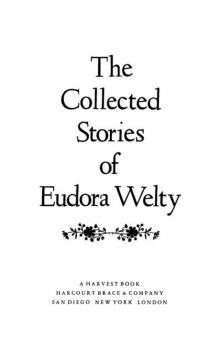- Home
- Eudora Welty
The Robber Bridegroom Page 2
The Robber Bridegroom Read online
Page 2
"I was once married to a beautiful woman of Virginia/' he said, "her name was Amalie. We lived in the peaceful hills. The first year, she bore me two blissful twins, a son and a daughter, the son named for me and the daughter named Rosamond. And it was not long before we set out with a few of the others, and were on our way down the river. That was the beginning of it all/' said Clement, "the journey down. On the flatboat around our fire we crouched and looked at one another—I, my first wife Amalie, Kentucky Thomas and his wife Salome, and the little twins like cubs in their wrappings. The reason I ever came is forgotten now/' he said. "I know I am not a seeker after anything, and ambition in this world never stirred my heart once. Yet it
seemed as if I was caught up by what came over the others, and they were the same. There was a great tug at the whole world, to go down over the edge, and one and all we were changed into pioneers, and our hearts and our own lonely wills may have had nothing to do with it."
"Don't go fretting over the reason," said Jamie kindly, "for it may have been the stars."
"The stars shone down on all our possessions," said Clement, "as if they were being counted and found a small number. The stars shone brightly—too brightly. We could see too well then not to drift onward, too well to tie up and keep the proper vigil. At some point under the stars, the Indians lured us to shore."
"How did they do it?" asked Jamie. "What trick did they use? The savages are so clever they are liable to last out, no matter how we stamp upon them."
"The Indians know their time has come," said Clement. "They are sure of the future growing smaller always, and that lets them be infinitely gay and cruel. They showed their pleasure and
their lack of surprise well enough, when we climbed and crept up to them as they waited on all fours, disguised in their bearskins and looking as fat as they could look, out from the head of the bluff."
"They took all your money, of course/' said Jamie. "And I wonder how much it was you would have had to give. Only yesterday I heard of a case where travelers captured in the wilderness gave up three hundred doubloons, seventy-five bars of gold in six-by-eights, five hundred French guineas, and any number of odd pieces, the value of which you could not tell without weighing them—all together about fifteen thousand dollars/'
But if he spoke a hint, Clement did not hear it. "The money was a little part/' he said. "In their camp where we were taken—a clear-swept, devious, aromatic place under flowering trees— we were encircled and made to perform and go naked like slaves. We had to go whirling and dizzied in a dance we had never suspected lay in our limbs. We had to be humiliated and tor-
tured and enjoyed, and finally, with the most precise formality, to be decreed upon. All of them put on their blazing feathers and stood looking us down as if we were little mice."
"This must have been long ago/' said Jamie. "For they are not so fine now, and cannot do so much to prisoners as that/'
"The son named after me was dropped into a pot of burning oil," said Clement, "and my wife Amalie fell dead out of the Indians' arms before the sight. This made the Indians shiver with scorn; they thought she should have lived on where she stood. In their contempt they turned me free, and put a sort of mark upon me. There is nothing that you can see, but something came out of their eyes. Kentucky Thomas was put to death. Then I, who had shed tears, and my child, that was a girl, and Salome, the ugly woman they were all afraid of, were turned into the wilderness, bound together. They beat us out with their drums."
"The Indians wanted you to be left with less than nothing," said Jamie.
"Like other devices tried upon a man's life, this could have compelled love/' Clement said. "I walked tied beside this woman Salome, carrying my child, hungry and exhausted and in hiding for longer than I remember/'
"And now she is your second wife/' said Jamie, "and you have prospered, have you not?" "From the first, Salome turned her eyes upon me with less question than demand, and that is the most impoverished gaze in the world. There was no longer anything but ambition left in her destroyed heart. We scarcely spoke to each other, but each of us spoke to the child. As I grew weaker, she grew stronger, and flourished by the struggle. She could have taken her two hands and broken our bonds apart, but she did not. I never knew her in any of her days of gentleness, which must have been left behind in Kentucky. The child cried, and she hushed it in her own way. One morning I said to myself, If we find a river, let that be a sign, and I will marry this woman/ but I did not think we w T ould ever find a river. Then almost at once we came upon it—
the whole Mississippi. A priest coming down from Tennessee on a flatboat to sell his whisky stopped when he saw us, cut us loose from each other, then married us. He fed us meat, blessed us, gave us a gallon of corn whisky, and left us where we were/'
"And you turned into a planter on the spot," said Jamie, "and I wonder how much you are worth now!"
"There on the land which the King of Spain granted to me," said Clement, bent to tell his full story now or burst, "I built a little hut to begin with. But when my first tobacco was sold at the market, Salome, my new wife, entreated me in the night to build a better house, like the nearest settler's, and so I did. There was added the fine bedroom with a mirror to hang on the wall, and after the bedroom a separate larder, and behind the house a kitchen with a great oven. And behind the kitchen in a little pen was a brand-new pig, and tied beyond him to a tree was a fresh cow. A big black dog barked in the dooryard to keep anybody out, and a cock
jumped on the roof of the house every morning and crowed loud enough to alarm the whole country.
" 'How is this, wife?' said I.
" 'We shall see/ Salome said. Tor it is impossible not to grow rich here/ "
"And she was right/' said Jamie.
"Yes, she was right/' Clement said. "She would stand inflexible and tireless, casting long black shadows from the candle she would be always carrying about the halls at night. She was never certain that we lived unmolested, and examined the rooms without satisfaction. Often she carried a rifle in the house, and she still does. You would see her eyes turn toward any open door, as true as a wheel. I brought her many gifts, more and more, that she would take out of their wrappings without a word and lay away in a chest/'
"A woman to reckon with, your second wife/* said Jamie with a musing smile.
Clement closed his lips then, but he remembered how in her times of love Salome was im-
measurably calculating and just so, almost clock-like, in the way of the great Spanish automaton in the iron skirt in the New Orleans bazaar, which could play and beat a man at chess.
"As soon as possible," said Clement aloud, "I would bring her another present, to stop the guilt in my heart."
''Guilt is a burdensome thing to carry about in the heart," said Jamie. "I would never bother with it."
''Then you are a man of action," said Clement, "a man of the times, a pioneer and a free agent. There is no one to come to you saying 'I want' what you do not want. 'Clement/ Salome would say, 1 want a gig to drive in to Rodney/ 'Let us wait another year/ said L 'Nonsense!' So there would be a gig. Next, 'Clement, I want a row of silver dishes to stand on the shelf/ 'But my dear wife, how can we be sure of the food to go in them?' And the merchants, you know, have us at their mercy. Nevertheless, my next purchase off the Liverpool ship was not a new wrought-iron plow, but the silver dishes. And it did seem
that whatever I asked of the land I planted on, I would be given, when she told me to ask, and there was no limit to its favors/'
"How is your fortune now?" asked Jamie, leaning forward on his two elbows.
"Well, before long a little gallery with four posts appeared across the front of my house, and we were sitting there in the evening; and new slaves sent out with axes were felling more trees, and indigo and tobacco were growing nearer and nearer to the river there under the black shadow of the forest. Then in one of the years she made me try cotton, and my fortune was made. I suppose that at the moment/' said C
lement in conclusion, but with no show of confidence (for to tell the truth, he was not sure exactly what he was worth), "I may be worth thousands upon thousands of gold pieces/*
"You are a successful man/' said Jamie, "willy-nilly/'
"But on some of the mornings as I ride out/' said Clement, "my daughter Rosamond runs and stops me on the path and says, 'Father, why was
it you shouted out so loudly in the night?' And I tell her that I had a dream. What was your dream?' says she. In the dream, whenever I lie down, then it is the past. When I climb to my feet, then it is the present. And I keep up a struggle not to fall/ And Rosamond says, 'It is my own mother you love, swear it is so/ And Salome listens at the doors and I hear her say to herself, 'I had better wake him each morning just before his dream, which comes at dawn, and declare my rights/ " Clement sighed and said, "It is want that does the world's arousing, and if it were not for that, who knows what might not be interrupted?"
But Jamie said he must go, and reminded him of the passport that was needed.
"You have interested me very much/' said Clement, when he had written it out; for the poor man was under the misapprehension that he now knew everything about Jamie, instead of seeing the true fact that Jamie now knew everything about him. "And in order to persuade you to settle near-by, and come and talk more
to me in the evenings, I invite you to dine with me on next Sunday night. It is only three hours' ride away, and I will meet you here to show you the way/'
"And I think I will come," said Jamie, his teeth flashing in a smile. But his look was strange indeed.
"I wish to introduce you," said Clement, nevertheless, "to Salome; and to my daughter Rosamond, who is so beautiful that she keeps the memory of my first wife alive and evergreen in my heart."
Then they both rode away—Clement through the wilderness to his plantation, and Jamie on an errand of his own, with the raven perched on his shoulder.
A,
L WAY OUT in the woods from Rodney's Landing, in a clearing in the live-oaks and the cedars and the magnolia trees, with the Mississippi River a mile to the back and the Old Natchez Trace a mile to the front, was the house Clement Musgrove had built that had grown from a hut, and there was the smoke now coining out the chimney. So while he was riding home through
31
the wilderness, there in the kitchen was his wife Salome, stirring a ladle in a pot of brew, and there at the window above was his daughter Rosamond, leaning out to sing a song which floated away on the air.
Rosamond was truly a beautiful golden-haired girl, locked in the room by her stepmother for singing, and still singing on, because it passed the time away better than anything else. This was the way the song began:
"The moon shone bright, and it cast a fair light: 'Welcome,' says she, 'my honey, my sweet! For 1 have loved thee this seven long year, And our chance it was we could never meet.'
Then he took her in his armes-two, And kissed her both cheek and chin, And twice or thrice he kissed this may Before they were parted in twin."
Before Rosamond came to the end of this love ballad, which was meant to be very long, Salome unlocked the door and there she stood like an old blackbird.
"Well, lazy thing/' said she, "I need fresh herbs for the pot. There are some extra-large ones growing on the other side of the woods at the farthest edge of the indigo field. Go and pick them and don't come back till your apron is full/'
And for a thing like this she would send Rosamond out alone every morning while her father was away, when he knew nothing of it. She would think that perhaps the Indians might kidnap the girl and adopt her into their tribe, and give her another name, or that a leopard might walk out between two trees and carry her off in his teeth before she could say a word.
For if Rosamond was as beautiful as the day, Salome was as ugly as the night, and all her gnashing of teeth made her none the better-looking.
So Rosamond said, "Yes, stepmother/' and taking the time to dress herself in a light blue gown, bind her hair with a ribbon, and bake herself a little hoecake for a lunch, she made ready for her expedition.
"If you come back without the herbs, I'll
break your neck," said the stepmother. "Now be
» gone!
Rosamond on her way had to pass through a little locust grove, and as she walked underneath the boughs where the wild bees were humming, she always took hold of her mother's locket, which she wore on a silver chain, and the locket would seem to speak of its own accord. What it never failed to say was, "If your mother could see you now, her heart would break/'
On she went then, and no sooner was she out of sight under the trees than up to the door rode Clement coming home on his horse. Salome had sent the girl away in the nick of time, and indeed she had had her eyes upon her husband since he was no more than a speck of dust, to see if she could tell from a distance what presents he was bringing; and she wanted to get her own name on the best ones.
Clement came in, and the first thing he said was, "Hello, wife, where is my little daughter gone?" for she had not run out to meet him, and
that was as if the jessamines had not bloomed that year.
"Oh, she is safe enough, I have no doubt, and has forgotten us entirely," replied Salome, with a smile on her face all its own. "Her idleness has led her out of the house again, out dressed in her best, fit to meet the King there in the nettles, and not a word behind her of where she was going. Here I am keeping her dinner warm over the fire/' For this was the way she would talk to her husband.
"My poor little daughter!'' said Clement sadly. "It is a good thing that I married the woman who would look after my child/' he said to himself, "or what would happen to her then?"
Then Salome gritted her teeth, but she saved up on her anger to vent it in some grand way later, when the time was sure to come.
"How much did you get for your tobacco, and where are the presents you were to bring?" she said next.
"Here are the moneybags, count it for yourself when the table is cleared," said Clement,
who would not cheat even a little midge of its pleasures. "And here is the packet of needles, the paper of pins, length of calico, pair of combs, orange, Madeira, and muscadine wine, the salt for the table, and all from the apothecary that he could provide/'
"And is the silk gown for me too?" Salome asked, paying no heed to the rest but holding up to herself a beautiful dress the green of the sugar cane, and looking like an old witch dressed up for a christening.
"No, that is not for you, but for Rosamond," said Clement. "And so are the hairpins, and the petticoat stitched all around with golden thread, the like of which the young ladies are wearing in New Orleans."
"As if she were not vain enough as it is!" cried Salome. "And now these fancy things will be putting thoughts into her head, you mark my words, and away she will run, off with some river rat, like Liwie Lane and her sister Lambie on the next plantation, there within a week of each other."
Then Rosamond came back, with an apron full of herbs for the pot, and tried on the dress and the petticoat both before she would eat. What a sight she was! She pinned up her hair and she swept up and down the puncheon floor swaying like a swan, and flung her train about.
And the moment she saw Rosamond in the new clothes, Salome's heart felt like lead, and she had no more peace day or night.
"What have you been doing while I was gone?" said Clement when Rosamond had flung her arms around his neck to thank him, for she had never suspected that he would bring her anything except a childish and harmless toy.
"Oh, every day I go to the farthest edge of the indigo field, on the other side of the woods, and gather the herbs that grow there," said Rosamond, "for my stepmother will have no other kind. And today a little old panther came out from behind a holly tree and rubbed up against my side. I took him in my arms, to see what he would do, and he gave me a little purr. Just then the mother panther let go from the tree above
my head, and down she lit on her
feet, stirring up the leaves like a whirlwind and growling from end to end, like the gold organ in the Rodney church. She was ten feet long and she must have been nine feet high when her hair started rising, for she reached away over my head when I looked her up and clown. The first thing I knew she took me up in her teeth, but very easy, by the sash, and carried me all the way home through the woods before she set me down at the gate. She swung me hard, and I knew she meant it for a lesson, and so I came away from her, and here I am, but the whole time I never dropped the leaf of one herb/'
Now Rosamond was a great liar, and nobody could believe a word she said. But it took all the starch out of the stepmother, you can be sure, to send Rosamond out on a dangerous errand, hoping some ill might befall her, and then to have her come safely back with a tale of something even worse than she had wished upon her. As for Rosamond, she did not mean to tell anything but the truth, but when she opened her
mouth in answer to a question, the lies would simply fall out like diamonds and pearls. Her father had tried scolding her, and threatening to send her away to the Female Academy, and then marching her off without her supper, but none of it had done any good, and so he let her alone. Now and then he remarked that if a man could be found anywhere in the world who could make her tell the truth, he would turn her over to him. Salome, on the other hand, said she should be given a dose of Dr. Peachtree.
"Next year, perhaps, she will submit to a tutor/' said Clement to Salome, "and learn Greek and sewing and the guitar/'
"Never! I will learn it all for myself/' said poor Rosamond, and picking up the guitar, sure enough, she played "Fair as the Rose/'
Near Clement's house, down in a gully, lived a poor widow and her six gawky daughters and her only son. The son, who was the youngest, was named Goat, because he could butt his way out the door when his mother left him locked in,
and equally, because he could butt his way in when she left him locked out. Every time she would go off, and tell him to be sure not to stir from the house while she was gone, to any wrestling matches, horse races, gander pullings, shooting matches, turkey shoots, or cockfights whatever in Rodney, or she would knock his head off with the skillet, she would be sure to find him missing when she got back. And this in spite of all her promises to bring him presents, and so it was useless to bring him any. Goat was full of curiosity, and anything he found penned up he would let out, including himself. He had let loose all the little colts and pigs and calves and the flocks of geese, peahens, chickens, and turkeys in that part of the country, and he would let anything out of a trap, if he had to tear its leg off to do it.

 On Writing
On Writing Losing Battles
Losing Battles The Robber Bridegroom
The Robber Bridegroom The Optimist's Daughter
The Optimist's Daughter The Collected Stories of Eudora Welty
The Collected Stories of Eudora Welty Delta Wedding
Delta Wedding The Ponder Heart
The Ponder Heart